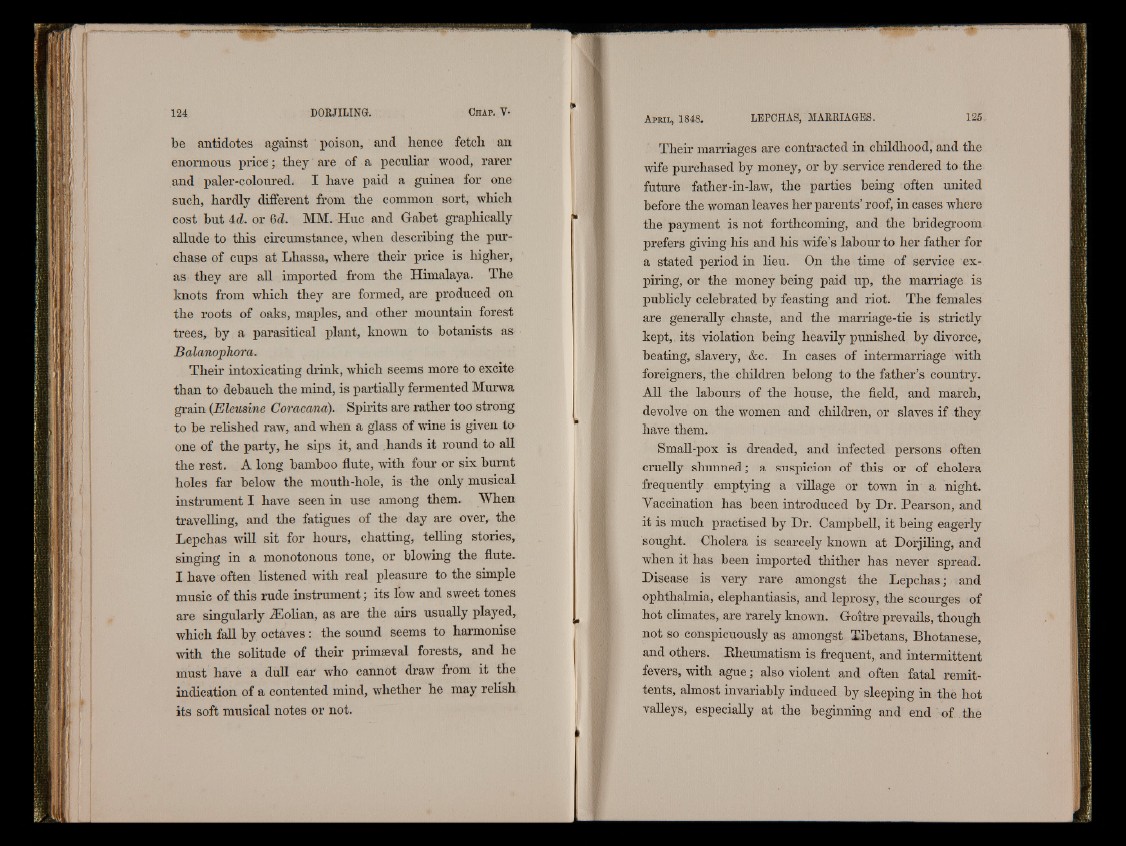
be antidotes against poison, and hence fetch an
enormous price; they are of a peculiar wood, rarer
and paler-coloured. I have paid a guinea for one
such, hardly different from the common sort, which
cost but 4d. or 6d. MM. Hue and Gabet graphically
allude to this circumstance, when describing the purchase
of cups at Lhassa, where their price is higher,
as they are all imported from the Himalaya. The
knots from which they are formed, are produced on
the roots of oaks, maples, and other mountain forest
trees, by a parasitical plant, known to botanists as
Balanophora.
Their intoxicating drink, which seems more to excite
than to debauch the mind, is partially fermented Murwa
grain (Eleusine Coracana). Spirits are rather too strong
to be relished raw, and when a glass of wine is given to
one of the party, he sips it, and hands it round to all
the rest. A long bamboo flute, with four or six burnt
holes far below the mouth-hole, is the only musical
instrument I have seen in use among them. When
travelling, and the fatigues of the day are over, the
Lepchas will sit for hours, chatting, telling stories,
singing in a monotonous tone, or blowing the flute.
I have often listened with real pleasure to the simple
music of this rude instrument; its low and sweet tones
are singularly iEolian, as are the airs usually played,
which fall by octaves: the sound seems to harmonise
with the solitude of their primaeval forests, and he
must, have a dull ear who cannot draw from it the
indication of a contented mind, whether he may relish
its soft musical notes or not.
Their marriages are contracted in childhood, and the
wife purchased by money, or by service rendered to the
future father-in-law, the parties being often united
before the woman leaves her parents’ roof, in cases where
the payment is not forthcoming, and the bridegroom
prefers giving his and his wife’s labour to her father for
a stated period in lieu. On the time of service expiring,
or the money being paid up, the marriage is
publicly celebrated by feasting and riot. The females
are generally chaste, and the marriage-tie is strictly
kept, its violation being heavily punished by divorce,
beating, slavery, &c. In cases of intermarriage with
foreigners, the children belong to the father’s country.
All the labours of the house, the field, and march,
devolve on the women and children, or slaves if they
have them.
Small-pox is dreaded, and infected persons often
cruelly shunned; a suspicion of this or of cholera
frequently emptying a village or town in a night.
Vaccination has been introduced by Dr. Pearson, and
it is much practised by Dr. Campbell, it being eagerly
sought. Cholera is scarcely known at Dorjiling, and
when it has been imported thither has never spread.
Disease is very rare amongst the Lepchas; and
ophthalmia, elephantiasis, and leprosy, the scourges of
hot climates, are rarely known. Goitre prevails, though
not so conspicuously as amongst Tibetans, Bhotanese,
and others. Bheumatism is frequent, and intermittent
fevers, with ague; also violent and often fatal remittents,
almost invariably induced by sleeping in the hot
valleys, especially at the beginning and end of the